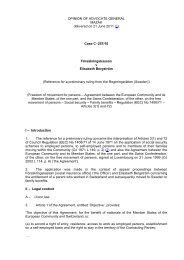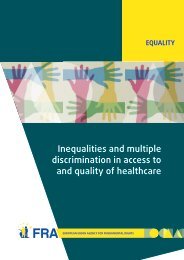Study on non-legislative initiatives for companies to promote gender ...
Study on non-legislative initiatives for companies to promote gender ...
Study on non-legislative initiatives for companies to promote gender ...
Create successful ePaper yourself
Turn your PDF publications into a flip-book with our unique Google optimized e-Paper software.
Gender equality <strong>initiatives</strong> 99<br />
To achieve sustainable results, many of these <strong>initiatives</strong> combine a range of measures<br />
in various fields of interventi<strong>on</strong>. In the following, the <strong>initiatives</strong> are described al<strong>on</strong>g 7<br />
important fields of interventi<strong>on</strong>, which are:<br />
• recruitment;<br />
• rec<strong>on</strong>ciliati<strong>on</strong>;<br />
• retenti<strong>on</strong>;<br />
• career opportunities;<br />
• training;<br />
• networking (incl. men<strong>to</strong>ring);<br />
• communicati<strong>on</strong><br />
As many of the <strong>initiatives</strong> are rather comprehensive, the attributi<strong>on</strong> <strong>to</strong> <strong>on</strong>e of these<br />
fields has been d<strong>on</strong>e according <strong>to</strong> the main elements of the initiative, but there may<br />
also be interdependencies, especially when the latter three fields are used as means<br />
that may serve the first four fields. Nevertheless, the attributi<strong>on</strong> is helpful as it facilitates<br />
the exchange of experiences and the transfer of certain approaches or parts of<br />
<strong>initiatives</strong> am<strong>on</strong>g <strong>companies</strong>.<br />
3.2 Reas<strong>on</strong>s <strong>for</strong> launching <strong>gender</strong> equality <strong>initiatives</strong> at company level<br />
In the past decade, the issue of <strong>gender</strong> equality at the workplace has, al<strong>on</strong>g with the<br />
raising importance in the public discussi<strong>on</strong> gained importance am<strong>on</strong>g <strong>companies</strong> and<br />
especially multinati<strong>on</strong>al <strong>companies</strong> explicitly address this <strong>to</strong>pic. As employee data of<br />
many <strong>companies</strong> reveal that there are <strong>gender</strong> biases throughout hierarchical levels or<br />
job positi<strong>on</strong>s, <strong>companies</strong> have started <strong>to</strong> investigate the reas<strong>on</strong>s <strong>for</strong> such biases and <strong>to</strong><br />
work <strong>on</strong> balancing their teams.<br />
The <strong>companies</strong> analysed in the course of this research project have been asked about<br />
their reas<strong>on</strong>s <strong>for</strong> launching <strong>initiatives</strong> <strong>to</strong> <strong>promote</strong> <strong>gender</strong> equality within their enterprise.<br />
There is c<strong>on</strong>sensus that such <strong>initiatives</strong> have <strong>to</strong> make ec<strong>on</strong>omic sense, but there is a<br />
range of motivati<strong>on</strong>s that act as drivers. To give an overview <strong>on</strong> why <strong>companies</strong><br />
engage in <strong>gender</strong> equality issues, some important external and internal drivers are<br />
summarised in the following.<br />
External drivers:<br />
• political and legal framework in order <strong>to</strong> increase employment rate <strong>to</strong> ensure<br />
financial viability of social model including pensi<strong>on</strong> schemes: Treaty <strong>on</strong><br />
European Uni<strong>on</strong>, Gender Equality Pact, EU Strategy <strong>for</strong> Growth & Employment<br />
(Lisb<strong>on</strong> Strategy), nati<strong>on</strong>al legislati<strong>on</strong> & <strong>initiatives</strong> (rising need <strong>to</strong> react <strong>to</strong><br />
societal expectati<strong>on</strong>s)<br />
• recogniti<strong>on</strong> that the working populati<strong>on</strong> is changing, ageing and becoming more<br />
reliant <strong>on</strong> women - there is a need <strong>to</strong> resp<strong>on</strong>d <strong>to</strong> this by ensuring <strong>to</strong> attract and<br />
retain the most talented pers<strong>on</strong>s (attract female talent as well <strong>to</strong> ensure a<br />
competitive positi<strong>on</strong>)<br />
o shortages in the work<strong>for</strong>ce due <strong>to</strong> ageing society;
















